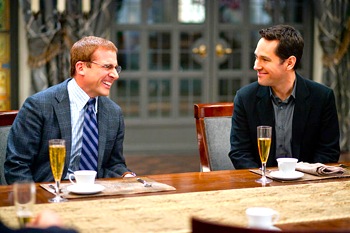 By The Joker. Studio note number 63: “The protagonist isn’t likeable enough.”
By The Joker. Studio note number 63: “The protagonist isn’t likeable enough.”
My response: “Likeability? That didn’t stop the studio from hiring you.”
Welcome to The Tyranny of Likeability.
You’ve just read a very common studio note that suggests the basic problem with today’s compulsive over-tinkering on comedies. Sometimes characters aren’t supposed to be likeable. Sometimes that’s why they’re funny.
Take Dinner for Schmucks. Based on the vastly superior French film, Le Diner de Cons (“The Dinner Game”) – written and directed by Francis Veber – Dinner for Schmucks is about a group of mean-spirited executives who invite idiots over for dinner in order to make fun of them.
In other words, the film is about a group of actual schmucks.

Surprise, surprise, after the French film was remade by the studio, test audiences found the executives to be “too unlikeable.” The studio panicked, the film was recut, and voilà, the characters were suddenly redeemable.
Too bad the movie wasn’t funny anymore.
Part of the problem here is relying on test audiences and focus groups. A studio questionnaire will literally ask, “What was your least favorite scene?” Invariably, audiences choose scenes in which something bad happens. (I’m sure if they had NRG screenings in the 1970’s, the audience’s least favorite scene in Rocky would have been: “when Rocky loses the fight.”) The studio interprets this as a scene that needs to be fixed instead of a scene that merely evokes negative emotions (perhaps masterfully). And since the studio is afraid of films testing badly, they force absurd changes on the story.
Because as I mentioned previously, fear is what rules Hollywood. And when people are afraid, they want to be liked. Call it The Tyranny Of Likeability.
Posted on August 11th, 2010 at 10:02am.
The reason that the French can make a movie like “Le Diner de Cons” and have it be a success is because they’re not afflicted with the sentimentality of the Americans. Europeans as a whole do not have this overwhelming need to give everything the easy answer, the half-baked cliche.
Europeans as a whole do not have this overwhelming need to give everything the easy answer, the half-baked cliche.
I like the cuisine analogy. Presumably this means that euro media depiction of capitalists and business people uniformly as evil profit mongering clowns is a “fully-baked cliche”, as opposed to the Hollywood half baked ones.
Rocky may have lost the first fight, but he sure made more money at the box office when he won the next 4. (I am specifically not including Rocky V because that sucked beyond belief) And although he “lost” in ROcky Balboa, we all know he “won.” 😉
Actually, I’m not sure that’s true. I think the original – adjusted for inflation – was the most successful.
I recently read something about French vs. American culture on another site and thought it relates well to what you were saying about Americans being so worried about “likeability.”
An American was complaining that when they visit Paris, people don’t smile a lot in public. A Parisian wrote in and said that in France, to go around grinning all the time is considered either a sign of foolishness or senility.
So there you go. That’s the difference between the two cultures.
For what it’s worth, I’ve noticed the same thing from my own time over there …
“Studio note number 63: “The protagonist isn’t likeable enough.”
My response: “Likeability? That didn’t stop the studio from hiring you.”
Well put, Joker.